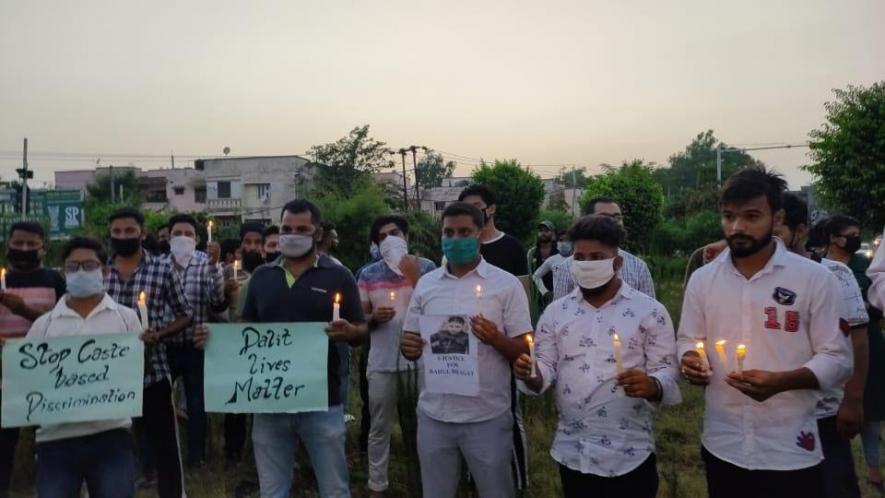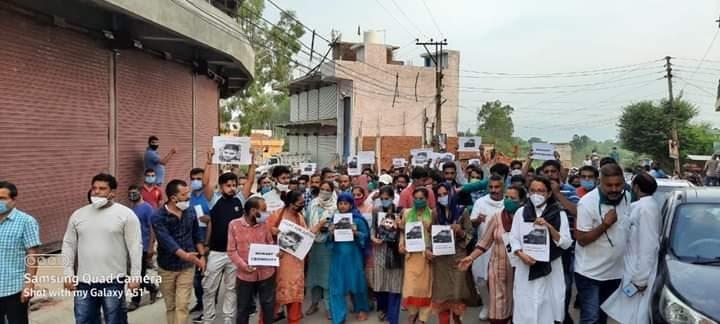Jammu: Dalit Man Hacked to Death Over Land Dispute in Udhampur, Sets off Protests

A 26-year-old dalit man, Rahul Bhagat, was hacked to death in broad daylight in Dandyal village of Jammu’s Udhampur district on July 2 over a land dispute. The incident took place at 11 AM when Bhagat, a bike mechanic, was chased by few men while he was on his way home from the police station to fetch few documents. The police has arrested four suspects all of whom are said to have confessed to the crime.
According to the Udhampur Police, Bhagat was involved in a land dispute case which is currently in the court. “The young man was murdered over the land dispute. It is the case of land mafia and a SIT has been constituted to investigate in the matter,” said SHO Udhampur, Vijay Chowdhary.
As per the residents of his village, the dispute arose after the victim had approached court over the illegal occupation of his land. “Many years ago, Bhagat’s illiterate grandfather had sold land to few people in the village. After his death, the land mafia, which consists mostly of upper caste men, started illegally occupying the entire land which was challenged by the victim in the court. The family was threatened to withdraw the legal proceedings but they remained intact,” said Ram Lal Bhagat, a villager and president of Kabir Sanghathan.
The victim’s family suspects foul play involving the local Udhampur Police and have demanded the case to be investigated outside. According to his family, on the day of Bhagat’s killing, they were called to the police station in connection with a case file by Madan Singh – whose son has been arrested. “As we reached the station, we were asked to bring in few documents pertaining to the land for which Rahul returned home. When he didn’t arrive in the next half an hour, we grew suspicious and kept calling him. Then, we suddenly received a call from an unknown number to inform that the body of our son is lying in the barren land behind our residence,” said Pawan Kumar, Bhagat’s uncle, who had also gone to the police station.
Bhagat’s family and other villagers have also accused the police of showing laxity as they arrived two hours after they were informed about the dead body. “The police arrived two hours later and without an ambulance. The body of our son was taken in the three wheeler to District Hospital,” said Kumar.
While the police have refrained from commenting on the caste angle in the case, the family has asserted that if they were not dalits, their son would not have been killed. “Jab bhi hume threat kiya jaata tha toh yeh zarur kaha jaata tha ki tumhare jaise ke logon ko toh hum yuhi daaba denge. Hum kamzor hai, neeche jaati ke hai aur hamara koi pahunch system isliye yeh sab hua (Whenever they used to threaten us, they would make sure to remind that they can silence people like us easily. We are weak and from a lower caste, we do not have any connections. That is why all this has happened),” said Kumar, the victim’s uncle.
The incident has sparked off protests in Jammu by dalit rights groups demanding justice for Rahul Bhagat. People have poured into the roads holding placards reading “Stop Caste Discrimination,” “Dalit Lives Matter,” “Justice for Rahul Bhagat”, and so on.
“This is a pure case of caste violence. The way the body was almost mutilated was done to create fear among the dalits. These men wanted to set a precedence so that no dalit raises his voice again. This is not the first case. Similar incidents have occurred in the past and police have always covered up the cases as land disputes or some other inconsequential crime. This time we won’t keep quiet,” said Satish Vidrohi, president Ambedkar Yuva Sanghthan.

The victim’s family and activists have raised few questions about the alleged involvement of police in the matter. “I would want to ask how the culprits knew that Rohit was on his way home alone and it was the right time to attack him as his entire family was in the police station,” asked Kumar.
Dalit activist Vidrohi said that the family had lodged complaint at the police station regarding the incessant threats they were receiving. “They used to receive threats but no action was taken by the police. It was the police who should have taken the responsibility to protect them as they belong to the lower rung of the society,” he asserted.
The police has refuted these allegations and have maintained that this was a purely a land dispute case. A Special Investigation Team has been constituted to thoroughly investigate the matter. “We are investigating the matter and it simply looks like the case of land mafia and we believe that there is no caste angle to it,” said Investigating Officer of SIT, Rohit Chadgal. Speaking about the sections, the police said they have invoked Section 302 (murder), 120b (criminal conspiracy) and 34 (done by several persons in furtherance of common intention).
According to the 2011 census, the Scheduled Caste (SC) population of Jammu and Kashmir is 92,4991 which forms 8% of the total population of the erstwhile state and around 11.91% of the population belong to Scheduled Tribes. The Scheduled Caste in Jammu and Kashmir are mostly residing in rural area and have government job representation of 2 to 2.5%, as per the data collated by community leaders. The rest of the population is engaged as labourers, sweepers and working class in the industries.
With the abrogation of Article 370 and 35 A, the Scheduled Castes and Scheduled Tribes (Prevention of Atrocities) Act, has been extended to Jammu and Kashmir and Ranbir Penal Code has been replaced by Indian Penal Code (IPC). However, earlier there was no parallel law for addressing caste-based issues.
“Earlier, the cases were seen within purview of Article 17 of Indian constitution and different sections of Ranbir Penal Code (RPC). There were no special laws for treating the caste based discrimination/violence because of which no such cases ever came to the fore except few rape cases. So there has been no data as such. And it is difficult to keep data when hardly any case is registered under caste based atrocity,” said Advocate Ashok Basotra.
Now,that cases SC/ST Prevention of Atrocities Act has been extended to Jammu and Kashmir, the dalit community leaders are struggling due to the unawareness around it.
“The police doesn’t seem to be aware of such an act. Whenever we go to the police, they are caught by surprise when we mention this act. So we have planned to visit IGP requesting him to send out a circular to all police departments regarding the act,” said Vidrohi.
The victim’s family has also demanded the case to be taken up by the Crime Branch (CBI) for thorough investigation. The dalit groups have said that they will keep raising their voice until justice is served to Bhagat. “The upper caste men have, time and again, tried to snatch the little land we possess because of Sheikh Abdullah’s land to tiller act. The problem starts when we raise our voice that sets them thinking how dare a dalit raised his voice,” said Pawan Loni, President, Bhim Army, J&K.
However, the dalit groups also spoke about the fear perpetuating in the community after the abrogation of Article 35A. “We believe that with people from outside settling in Jammu now, the atrocities against dalits will see a rise,” said Loni.
Get the latest reports & analysis with people's perspective on Protests, movements & deep analytical videos, discussions of the current affairs in your Telegram app. Subscribe to NewsClick's Telegram channel & get Real-Time updates on stories, as they get published on our website.
























